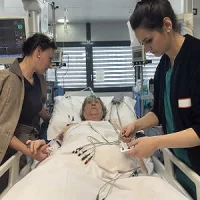The key to successful family conferences is interdisciplinary communication, and Randall Curtis, Director of the University of Washington Cambia Palliative Care Center, USA, shared his top tips on family conferences at the 37th International Symposium on Intensive Care and Emergency Medicine, held in Brussels, 21-24 March 2017.
Why Include the Family?
By holding meetings with the family, the intensive care team can support the family’s role in shared decision-making, support the family at the difficult time of having a critically ill loved one and improve the family's decision-making capacity by acknowledging and addressing emotions, said Curtis.Curtis and colleagues have researched extensively in the area of communication with families, and have found that good family conferences can improve patient and family outcomes. There are certain statements that the clinician can make that are associated with increased family satisfaction, according to a study by Stapleton:
- Assure the family that the patient will not be abandoned prior to death
- Assure the family that the patient will be kept comfortable and not suffer prior to death
- Provide support for family around decisions to withdraw or continue life support
One study looked at missed opportunities during ICU family conferences. From what was missing, they advise the intensive care team to:
Listen and respond
- answer questions
- clarify and follow up on family statements
Acknowledge and address emotions
Address tenets of palliative care - Curtis emphasised that palliative care is broader than just end-of-life care. I is focused on improving communication about goals of care and maximising comfort and quality of life.
- explore patient preferences
- explain surrogate decision-making
- affirm non-abandonment
A good family conference needs structure, advised Curtis. Have a pre-meeting with the team and prepare by going over the prognosis, the facts and have the correct people present.
At the beginning, start by introducing everyone, and assess the family’s understanding. Provide a simple overview or update, ask the family about the patient’s values and goals, respond to emotions, and express empathy.
Nurses have a key role in family conferences. They should participate in a “huddle” prior to conference. Once present, they can remind families of questions or concerns they may have raised at the patient’s bedside. They can also identify opportunities for supporting family members, and discuss what the process of withdrawing life support is and what dying is like.
Family conferences are likely to be used as an indicator of quality care, said Curtis. Basic skills for family conferences should be taught to all ICU clinicians, he recommended.
Claire Pillar
Managing editor, ICU Management & Practice
Image credit: Pixabay
References:
Curtis JR, White DB. Practical guidance for evidence-based ICU family conferences. Chest, 134(4): 835-43.
Latest Articles
ISICEM 2017, #ISICEM17, family
The key to successful family conferences is interdisciplinary communication, and Randall Curtis, Director of the University of Washington Cambia Palliativ...







